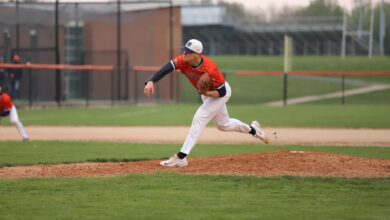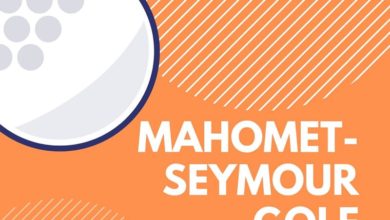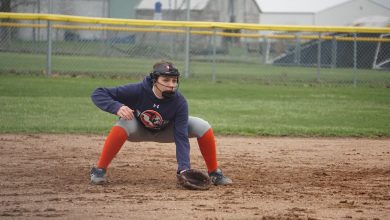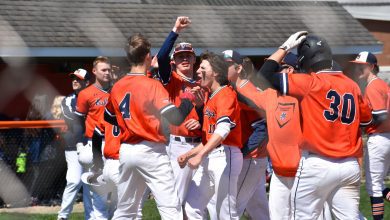Athlete of the Week: Makenna Barnes
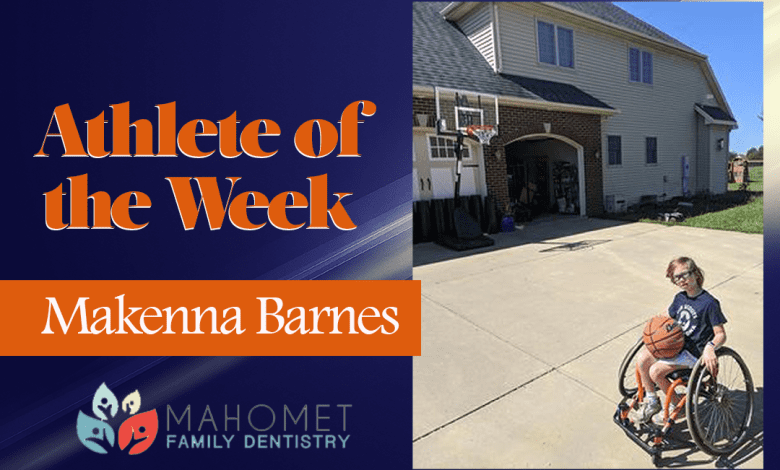

There’s always more than one way to get from Point A to Point B.
But most people, no matter what their circumstances, never stop to ponder the options. They just go.
This is how nine-and-a-half-year-old Makenna Barnes operates.
“She’s a very active kid,” her mom Meredith Barnes said.
Makenna swims “like a dolphin,” likes to block shots on the basketball court, enjoys racing around the track, and can light up a room with her smile. Of course, these are things that many children under the age of 10 can do. Makenna just does them a little bit differently.
Before Makeena was born, her parents were told that she would likely be born with spina bifida, a birth defect that occurs when the spine and spinal cord don’t form properly. After birth, Makenna was also diagnosed with hydrocephalus, a buildup of fluid in the cavities deep within the brain, and a congenital condition called Chiari II, a problem in which a part of the brain at the rear of the skull bulges through a normal opening (foramen magnum) in the skull where it joins the spinal canal. By age 2, doctors also said she had central sleep apnea.
So, getting from Point A to Point B sometimes means that she’s walking, and other times it means that she’s in a wheelchair. Some days Point A to Point B means surgery, while other days it means taking care of her dog and fish. Some days Point A to Point B means “bumping people over” in sled hockey while other days it means trying out tennis.
Today (March 4) Makenna is going through one of those transition periods after surgery. She was hopeful that the surgery would happen a week earlier so she would make it onto the court for the IHSA Wheelchair Basketball Tournament at the University of Illinois on March 11 and 12. But, at this time, she’ll have to wait for next year.
Even so, she still got on the court to practice her shot, lighting up the net, on the few warm February days. She knows her team, the Peoria Wildcats, the only wheelchair basketball team between Chicago and St. Louis, needs her spunk.
“Makenna is tenacious on the court,” Maureen Gilbert, the coordinator of the adaptive athletics program at the University of Illinois said. “She works hard and plays hard. She is not intimidated by players who are bigger or older than she is. She has a lot of confidence and big dreams to become a great wheelchair athlete.”
Next weekend will be the first time the Peoria Wildcats have been together in almost two years. With COVID-19 numbers drastically declining, athletes are looking forward to the chance to get back together and compete.
Athletes near Champaign-Urbana practice separately from their Peoria teammates, and prior to the pandemic, those groups would come together in Bloomington to practice.
Makenna, a Mahomet resident, has been able to keep up her skill set through the University of Illinois’ wheelchair basketball summer camp program. As an added bonus, Makenna has formed friendships with collegiate and Olympic athletes.
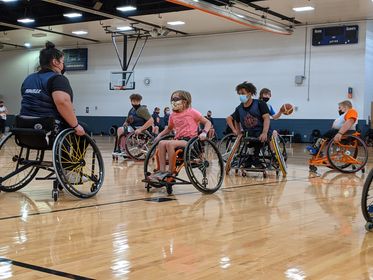
“So it’s pretty fun for Makenna to see them on TV and cheer them on,” Meredith said.
Meredith said watching the way the community of athletes comes together, no matter what their age, is special.
“It’s awesome to see her and see the community; it’s like long-lost friends,” Meredith said. “She sees all these people and then when they come back together, it’s like no time has passed and they just pick up right where they left off.
“The friendships are pretty invaluable. It’s like they have this unspoken group of people. It’s not even just the other athletes, it’s the families, too that support all the athletes. It’s just like one big family.”
That family is one that goes beyond the border of any one town or state, according to Gilbert.
“Mentoring young athletes is a big part of the Illinois Wheelchair Athletics Program,” Gilbert said. “Our summer camps bring in kids from all over the US and sometimes internationally.
“While at camp, they are coached by our athletes who work as counselors/coaches throughout the camps. The campers also get to watch our athletes play and demonstrate drills so they are learning from the athletes who have actually done the same type of drills and skill development. They also learn life skills from our athletes as well as the other campers.
“Many young children with physical disabilities don’t have peers that have a physical disability so they often feel left out of activities. Attending camp or being an ‘honorary coach’ for a game, gives them the opportunity to do an activity with other athletes with a disability and gives them an outlet to participate in sport with those who have similar abilities.”
Makenna remembers her time as an honorary coach fondly. She cheered on the team from the sidelines, giving them high fives for a job well done, and attending team meetings.
Whether or not basketball at the collegiate level is in the cards for Makenna, she says she’d pass on that opportunity at this point in her life. There are a few other ideas up her sleeve. Yet, she’s ready to get back on the court to chase people down, to get from Point A to Point B quicker and smarter than her opponent.
Sometimes that means Makenna has to go the extra mile to obtain her goals. And over time, she’s learned that it’s often best to bring a few friends along, a trait her mother said is infectious.
“I convinced my whole family and some other people to do a point challenge,” Makenna said. “You have to hold it for like 10 minutes. I can hold it for now for six minutes or five minutes.”
She needs that strength to get her wheelchair up a ramp at her elementary school without anyone else’s help.
Her “day” chair has limitations, too, though. It doesn’t turn as fast as her other options.
“I feel like I need my racing chair because when we run laps in the gym, I go so slow,” she said. “I’m like, come on.
“I could beat everyone. I’m fast.”
It’s something Maureen Gilbert has witnessed time and time again.
“Makenna has a great attitude and lots of energy,” Gilbert said. “She is very willing to try things and puts good effort forward. She is very friendly and outgoing and has a positive outlook in everything she does.”

